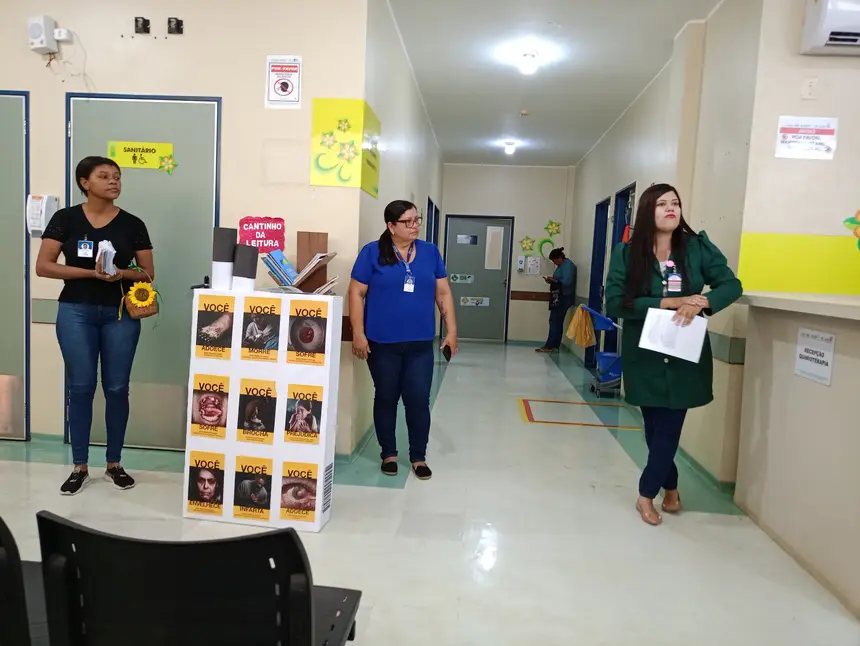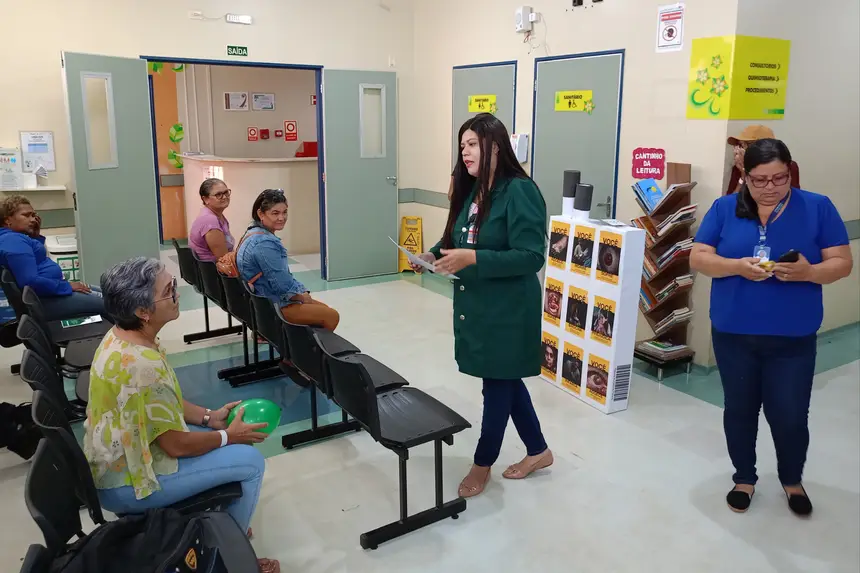Tucuruí Regional intensifies prevention and early detection measures for head and neck cancer
The "Green July" campaign aims to raise awareness among the population about the prevention, early diagnosis, and proper treatment of head and neck cancer, as the chances of cure are 90% when the disease is identified early.

With the aim of informing and sensitizing the population about the relevance of preventing head and neck cancer, the State Department of Public Health of Pará (Sespa), in collaboration with the Social Organization Instituto Diretrizes, responsible for the shared management of the Regional Hospital Complex of Tucuruí – HRT and Unacon, held a program on the morning of this Wednesday (16), aimed at employees, patients, and companions during the "Green July" campaign. The goal of the event was to strengthen the strategies for prevention and early detection of this type of cancer.
The general director of HRT and Unacon, Junior Souto, emphasizes the importance of the population and health professionals being alert to any changes that may arise in the patients' bodies or in their own bodies.
"The most important thing is to keep the entire society alert that head and neck cancer can be detected by the person themselves when noticing sores or lesions that do not heal after a certain period of evolution. Therefore, it is essential that health professionals, such as doctors, general practitioners, primary care professionals, and dentists, are always attentive to these lesions, which are often asymptomatic and usually do not cause discomfort. These are the lesions that, when diagnosed, allow for curative and early treatment," emphasizes the director.
Head and neck cancers encompass the areas of the face, mouth, and neck, that is, mouth, oropharynx, larynx (location of the vocal cords), as well as nose, sinuses, nasopharynx, orbit, neck, thyroid, scalp, and skin of the face and neck.
According to the National Cancer Institute (INCA), in 2024, more than 39,000 new cases of head and neck cancer were identified, not counting skin cancer. Head and neck neoplasms rank third among the most incident types in Brazil, affecting both sexes, usually between the ages of 50 and 60, and causing approximately 10,000 deaths annually.
Cancers in these areas cause significant changes in the patient's quality of life, making prevention and early diagnosis essential to increase the chances of cure.

There is concrete evidence about cancer that demonstrates the connection between lifestyle habits and tumor formation. Risk factors can be present in the physical environment, result from habits or customs, or be inherited. Examples include: smoking, excessive alcohol consumption, sun exposure without lip and sun protection, HPV infection, family history of cancer, low-iodine diet, obesity, environmental pollution, excess body fat, and occupational exposure to elements such as wood dust, chemicals used in metallurgy, oil, plastics, textile industries, and asbestos, among others.
The signs and symptoms that allow identification include: swelling or sore that does not heal in 15 days; lump in the mouth, neck, or jaw; reddish or whitish spots in the mouth; difficulty or pain when swallowing; speech problems; difficulty and pain when moving the mouth; difficulty breathing; persistent sore throat; and changes in voice or hoarseness for more than 15 days. It is essential to keep in mind that these symptoms can also be caused by other health conditions, which reinforces the need to seek medical attention.

The chances of cure are increased with early diagnosis and treatment. Prevention is the best form of cure; therefore, early diagnosis and the adoption of healthy habits are essential, such as: not smoking; avoiding excessive alcohol consumption; having a diet rich in fruits, vegetables, and legumes; regularly practicing physical activities; maintaining good oral hygiene; using sunscreen and avoiding prolonged sun exposure; using condoms during oral sex; maintaining an adequate body weight. Additionally, vaccination against HPV is recommended for girls and boys aged 9 to 14 years, as well as for immunosuppressed men and women aged 9 to 45 years living with HIV/AIDS, organ transplant recipients, or patients with cancer.
As part of the program held at the Unacon reception, users, patients, and companions received an illustrative folder with various guidelines, participated in a fun group dynamic, and had the opportunity to acquire more information on the topic and clarify doubts with Social Worker Amanda Cavalcante and the Coordinator of the Humanization Sector, Edigleuma Barroso.
Leonete Louzada, a resident of Tucuruí and participant in the action, highlighted: "It is very important for us to be aware of the signs and symptoms of this disease that silently affects the neck and head. By clearing our doubts and guiding where to seek the necessary care, we can not only reduce the incidence of these cancers but also pass on to others the necessary measures for healing."
SERVICE: The Dr. Vitor Moutinho High Complexity Oncology Unit (Unacon) is located next to HRT, in Vila Permanente, Tucuruí. The Social Organization Instituto Diretrizes, in shared management with the State Department of Health of Pará (Sespa), is responsible for the administration of the unit.
Unacon offers oncology services in hormone therapy, chemotherapy, radiotherapy, and oncological surgeries to users of the Unified Health System (SUS) in the regions of Tucuruí Lake, Carajás, and Araguaia.
Text: Wellington Hugles/ ASCOM/HRT/UNACON











